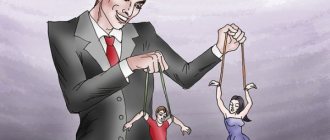Maslow's Motivation and Personality
In his works on the relationship between motivation, Abraham Maslow refers to the fact that man is an eternally desiring being. He rarely has a feeling of complete satisfaction, and if he does, it doesn’t last long. Having satisfied one desire, another immediately arises, a third, and so on endlessly. Incessant desires are a characteristic feature of a person, and also act as motivation throughout life. The external manifestation of one particular motive often depends on general satisfaction, as well as dissatisfaction with the needs of the body. For example, if a person is hungry or thirsty, if he is threatened every day by earthquakes or floods, if he constantly feels the hatred of others, then he will not have the desire to paint a picture, dress beautifully, or decorate his house.
A. Maslow argues that multiple motivations of behavior guide a person. This is confirmed by physiological studies of eating or sexual behavior. Psychologists know that often the same behavioral act expresses very different impulses. For example, a person eats so that the feeling of hunger disappears, but there are other reasons. Sometimes a person eats to satisfy other needs. By having sex, a person satisfies not only sexual desire. Some assert themselves; others feel power, feel strong; still others are looking for sympathy and warmth.
Social motives of the individual
As already mentioned, the social motives of an individual are generated from the needs of socialization in society. Abraham Maslow classifies attachment as a social motive. These motives represent the desire to be needed, useful, and to have approval from other people. In addition, social motives are determined by the need for respect, as well as self-esteem, which is no less important.
Every person exists in society and is connected with people. Relationships between people are never simple, so various conflicts, hostility and other unpleasant phenomena arise. But, one way or another, a person is born into society, but sometimes society itself gives birth to a person. For this reason, it is very natural that a person tries to find his place in society and establish his identity among the people he knows.
In this area, a person can act in various ways, guided by social motives. For example, in order to please other people, so as not to violate the ideas of society, a person can show conformity, that is, act like the majority.
Human nature is very complex and mysterious. Relationships between two people can also be very unpredictable. People are driven by social motives in order not to be lonely. Every person is looking for another person who is able to understand, support, and most importantly love him for who he really is. This desire forces people to seek compromises in disagreements, change their behavior, and change for the better. These are the most important social motives of a person.
It is also worth noting submission to authority. Even if people complain about the government in the country and do not consider it constructive, they recognize its legitimacy and are convinced that power is necessary for society. This leads to submission to authority, which is also a social motive for the individual.
Motivation of personality behavior
Determined by the actualized need to excite certain nervous structures, the motivation of a person’s behavior is provoked by the directed activity of the body. This is how cognitive, nutritional, sexual, protective, and other types of motivation can arise. The triggering of sensory stimulation in the cerebral cortex, as well as their weakening or strengthening, depends on the motivation in a person’s behavior.
The effectiveness of an external stimulus comes from both objective qualities and motivation. A well-fed body will not respond to attractive food. External stimuli turn into stimuli after the necessary motivation of the body. Next, the brain models the parameters of objects that are needed to satisfy the need and develops activity patterns. These patterns of activity may be instinctive, innate, or based on experience.
The motivation for a person’s behavior is always emotionally charged, and what a person strives for excites him emotionally. All human motivations act as a modification of need states.
Motivational states of a person are understood as desires, interests, aspirations, inclinations, intentions, passions, attitudes.
Interests are expressed in a rich focus directly on objects that are associated with the stable needs of the individual. Interests are manifested in excessive attention to objects that have lasting significance. Interests act as motivational and regulatory mechanisms of human behavior, which are determined by the hierarchy of formed needs. It is important to understand that the connection between needs and interests is not straightforward, and is often not realized. The interests themselves can be indirect and direct, and they appear with the means to achieve goals. Interests significantly influence mental processes, activating them. Depending on the needs, interests are divided by content (spiritual and material), by stability and breadth (by versatile and limited), by stability (by short-term and sustainable). Interests help stimulate a person to activity, and are also themselves formed in activity. Satisfaction of interests contributes to the formation of an even more ramified system of interests. Acting as the orientational basis of individual behavior, interests turn into the main psychological mechanisms of behavior.
The breadth and depth of a person’s interests express the fullness of his life. An asocial personality is characterized by an egoistic orientation, narrowness, mercantilism, and utilitarianism. Personal characteristics include the range of interests of a given person. Passions, desires and drives are closely related to a person’s interests.
Desires are a certain stage in the maturation of needs that correlate with a goal, as well as an action plan. Desires are the motivational state of an individual, while needs are correlated with the subject of their satisfaction. Desires are associated with emotional aspirations of attraction to the object of desire. Human desires are divided into three groups:
- necessary and natural (the desire to drink, satisfy hunger, sleep, rest);
- natural, which however do not appear to be necessary (intimate desires);
- unnatural and neither necessary (thirst for glory, superiority over people, leadership, power, primacy).
Passion is expressed in an affective persistent desire for a certain object, while passion-need dominates and controls a person’s life. Passion integrates emotional and volitional drives. Passion can be negative or positive and it depends on the aspirations of the person. Most negative passions lead to personality degradation and often provoke criminal behavior.
Positive passions direct a person’s strength towards meaningful goals (passion for science, art, certain types of activities).
A complete absence of passions could lead to complete dullness. Passion is the heavenly fire that animates the moral world. Art and science owe discoveries to passion, and the soul to nobility. Obsessive gravitation refers to inclinations that can be natural, as well as be formed in social conditions. Natural attractions are often not recognized. The following sequence has been established in a number of instinctive drives: food drive, orientation behavior, motherhood drive, thirst, sexual desire, orientation behavior.
Human drives are determined by social life. Socialization of a person disciplines his drives. The weakening of mental processes provokes an increase in instinctive impulses. For example, unbridled sexual desires occupy a certain place in the structure of crime.
Personal motivation can be conscious or subconscious. The conscious motivation of an individual's behavior is directly related to intentions. Intention is an intention or consciously made decision to achieve a certain goal with a clear idea of the means, as well as methods of action.
Intentions are combined into drives that drive action or conscious planning. Intentions, like needs, have dynamic properties - strength, tension.
Intentions guide human behavior, and also ensure arbitrariness of actions and act as a conscious act of behavior. The justification for intention is motive.
Motives can be actual or potential
In each specific period of a person’s life, some motives are actual (active) and influence a person’s behavior and actions, while others are potential (can be actualized under the influence of any circumstances). Example: a boss promised a promotion to a subordinate for work completed ahead of schedule. For the employee, the motive of prestige has moved from potential to actual. In this situation, a change in motivation led to an increase in labor productivity.
Identifying yourself with another person
The essence of this motive is the desire to be like your idol. An idol can be any authoritative person: a relative, a mentor, a pop idol, and so on. This motive is especially relevant for teenagers entering life. The desire to imitate an idol in everything leads to the desire to change and develop. The identification motive helps a young person’s entry into society. But there is also a negative point here. “Don’t make yourself an idol” - taking a specific person as an example, a teenager wants to adopt all his qualities, including negative ones. For example: taking the personality of a rock singer as a model, a young man strives to copy the negativity associated with the external lifestyle of this person - alcohol, drugs (possibly in real life these are only a negative image).
Self-affirmation
One of the most positive motives in a person’s life. After all, it is precisely thanks to the desire to assert ourselves that we try to become better and achieve some goals in life. This is, in a way, the engine of development: a person’s desire to improve his formal and informal status leads to acquiring new knowledge, improving existing skills and acquiring new ones. Example: an athlete strives to win competitions with the thought: “I must be the best!” The motive of self-affirmation in this case comes to the fore.
Power
This is the driving force of human development. Since primitive times, people have shown a desire to dominate some group of people: to encourage them to act, to control their actions and thoughts. In the hierarchy of motives of human behavior, the desire for power occupies one of the leading places. On the path to achieving power, a person can overcome many obstacles. If this motive is dominant in human behavior, then social motives fade into the background. Such a leader, having achieved power, can damage the cause and become a brake on development. For example, an ordinary employee of an enterprise, driven by this motive, having received a leadership position, forgets about the goals of the functioning of his organization, he is busy only with retaining the acquired power, as a result, the profitability of the business suffers.
Procedural-substantive
This motive is based on the individual’s interest in the process of activity and its result. The influence of other motivations (self-affirmation, power, etc.) can enhance motivation, but not be decisive, so they are external to the main one. Example: a person goes in for sports, achieves positive results - he enjoys the process and content of his own activity - there is an actualization of the procedural-substantive motive. Other motives (material incentives, self-affirmation) are external, but not decisive. In other words, the meaning of activity is the activity itself.
Mutual influence of external and procedural motives
If motivational factors are outside the scope of activity, then they are external (extensive). These include:
- – a sense of duty, responsibility to society or a specific person;
- – desire for the approval of other people;
- – desire to improve one’s social status;
- – self-improvement and others.
If in any situation there are no procedural and substantive motives, then external motivation comes into play. For example, a student is studying at an institute, but is not interested in the learning process (lack of substantive motives), but there is a desire to get a diploma and get a prestigious job (external motivation). But, it is worth noting that if external factors are not supported by interest in the activity process, then the maximum result will not be achieved. The student will be able to get a diploma and get a job, but he will not be able to take a top position.
Self-development motive
Every person has a desire for self-development to one degree or another. This motive is not always updated; it is often drowned out by other motives. There are many inert people around us who live like plants, satisfying only their life support functions. Often, in order to actualize the desire for self-development and increase motivation for activity, a push is needed. Mentors (coaches, managers, teachers) who are interested in the success of their students need to remember this.
A person is designed in such a way that when moving forward he has various fears, that is, the instinct of self-preservation is triggered, which tries to protect a person from possible troubles. But without overcoming them there is no movement. "Through hardship to the stars".
Achievement motive
Achieving your goals is a strong motivating moment in any type of activity. A person may have different levels of achievement motivation in relation to different goals. For example, a novice athlete wants to win regional competitions and win the Olympic Games. The maximum level of achievement motive in this case will be aimed at winning local competitions, and only the average level will be aimed at winning at a higher level.
Scientists have identified several factors influencing the level of motivation:
- – significance of the goal;
- – subjective assessment of the possibility of achieving the goal;
- - hope for success.
The example discussed above clearly demonstrates these factors: the athlete realistically assesses his capabilities for success in achieving both goals, chooses the more realistic one and motivates himself to achieve it.
Socially significant motives (prosocial)
A person lives in society, works in a team. When prosocial motives are actualized, he has a particularly developed sense of duty and responsibility to other individuals in society. Of course, not everyone is the same. But to one degree or another, this is inherent in all people. “It’s impossible to live in society and be cut off from it.” Individuals for whom this motive is not at all actualized are called asocial.
For successful work in a team (at work, on a sports team, etc.), it is necessary to focus on prosocial motivation. This will unite the team and give positive results.
A politician who has this type of motivation is strong enough will root for his country not in words, but in deeds, and will do everything possible for its prosperity. It would be a good idea if, before running for office in the highest government bodies, officials would undergo a mandatory examination by a psychologist to determine the degree of prosocial motivation. This type of verification would help to nip corruption in our country in the bud.
Affiliation motive
Translated from English - accession. That is, the meaning of this motive is communication for the sake of communication. This involves finding joy and satisfaction in relationships with other people. The search for love is a kind of actualization of the motive of affiliation.
Negative motivation
This is an incentive to activity through fear of punishment. The motive is strong, but short-lived: it acts only under the influence of the inevitability of a negative impact. For example, teaching a child at school under pain of punishment for bad grades from parents. Motivation operates as long as a person is confident in the inevitability of punishment. Once control is loosened, the child again becomes a stable loser.
Forms of possible influence that can actualize negative motivation:
- – verbal punishment (condemnation, reprimand);
- – material sanctions (fines, etc.);
- – social isolation (ignoring, boycott, neglect, etc.);
- – physical impact;
- - deprivation of liberty.
Motivation for personal activity
A motive is a conscious impulse aimed at achieving a specific goal and accepted by an individual as a personal necessity.
The motivation of an individual is often driven by several motives. Certain motives are of leading importance and give meaning to an individual’s activities. Motives can conflict with the possibilities of their implementation. In these cases, the individual experiences a suppression of the motive or a change in it.
All motives must be distinguished from motivation. Motivation is understood as justifying statements regarding the action taken. Little-conscious impulsive actions occur on the basis of unconscious motives.
The motivation of an individual’s activity is determined by attitudes. An attitude is a readiness for a certain behavior. Attitude is the most constant, stable basis of human behavior. There are two types of installation - differentiated and general. Attitudes are the basis of behavioral stereotypes that free one from making decisions.
A complex mechanism of behavior includes the following components: motive, goals, programming, decisions, choice of means of implementation.
So, the motivation of an individual’s activity includes a complex of interrelated factors. And the motivation of the individual itself acts as a manifestation of needs. To understand the motive of a person, inner work is necessary. The term motivation was first mentioned by Schopenhauer. Currently, there are many interpretations of personal motivation. Motive is often confused with purpose and need. A need is understood as an unconscious desire to remove discomfort, and a goal is understood as the result of a conscious desire. For example: hunger is a need, the desire to satisfy hunger is a motive, and the peaches to which a person is drawn is a goal.
McClelland's theory of acquired needs
According to McClelland, the needs of the lower level (vital) in the modern world, as a rule, have already been satisfied, so attention should be paid to satisfying the highest human needs. These needs, if they are clearly manifested in a person, have a noticeable impact on his behavior, forcing him to make efforts and perform actions that should lead to the satisfaction of these needs. However, McClelland views these needs as acquired through life circumstances, experience, and learning.
The need for achievement manifests itself in a person's desire to achieve his goals more effectively than he did before. A person with a high need for achievement prefers to set his own goals and usually chooses moderately difficult goals and objectives based on what he can achieve and what he can do. Such people like to make decisions and take responsibility for them, are obsessed with the tasks they solve, and take personal responsibility.
Based on his research, McClelland came to the conclusion that this need can characterize not only individuals, but also individual societies. Those societies where the need for achievement is high tend to have developed economies. In contrast, societies characterized by a low need for achievement have low levels of economic development or no economic development at all.
The need for participation manifests itself in the form of a desire for companionship with other people. People with a high need for companionship strive to establish and maintain good relationships, seek approval and support from other people, and are concerned about what others think of them. The fact that someone needs them is very important to them.
The need for power, like the previous two, is an acquired need that develops on the basis of learning, life experience and lies in the fact that a person seeks to control the resources and processes in his environment. The main focus of this need is the desire to control the actions of other people, influence their behavior, and take responsibility for their actions and behavior. The need for power has two poles: firstly, the desire to have as much power as possible, to control everything and everyone, and secondly, the desire to completely abandon any claims to power, the desire to avoid such situations and actions that are associated with the need to perform functions authorities.
The needs for achievement, affiliation, and power in McClelland's theory are not mutually exclusive and are not arranged hierarchically, as in the theories of Maslow and Alderfer. Moreover, the manifestation of the influence of these needs on human behavior depends on their mutual influence. For example, if a person occupies a leadership position and has a high need for power, then in order to successfully carry out managerial activities in accordance with the desire to satisfy this need, it is desirable that his need for complicity be expressed relatively weakly. The combination of a strong need for achievement and a strong need for dominance can also lead to a negative impact on the manager's job performance, since the first need will always orient dominance towards the manager's personal interests. It is not possible to draw clear conclusions about the direction in which these three needs influence each other. However, it is obvious that it is necessary to take into account their mutual influence when analyzing human motivation and behavior and developing methods for managing the process of formation and satisfaction of needs [5]. motivation need stereotype behavior










